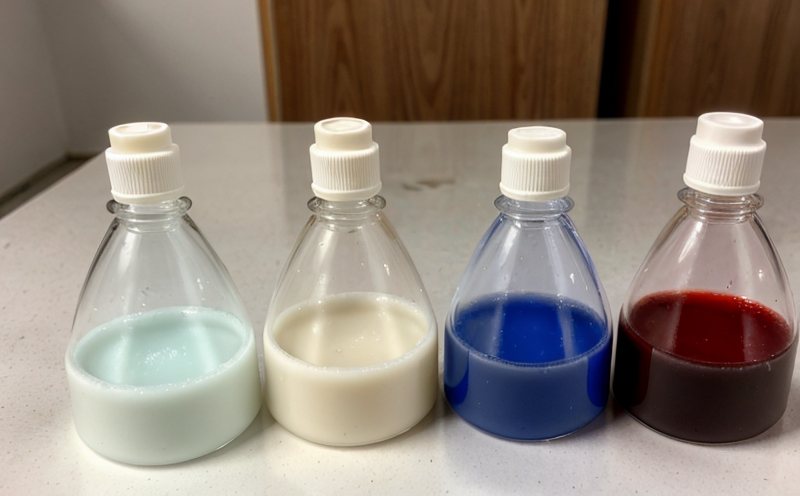JIS K0064 Monomer Testing in Polymeric Products
The Japanese Industrial Standards (JIS) K0064 specifies a method for determining the residual monomers content in polymeric products. This test is critical in ensuring that products, especially those used in industries like plastics manufacturing, meet safety and regulatory requirements. The testing process involves extracting monomers from the polymer matrix using solvents such as dimethylacetamide (DMAc) or tetrahydrofuran (THF). The extracted solution is then analyzed via gas chromatography (GC), typically equipped with a flame ionization detector (FID).
The importance of this test cannot be overstated, especially in sectors where the presence of monomers can lead to adverse health effects if not controlled. For instance, in food-contact applications or medical devices, even trace amounts of residual monomers could compromise product integrity and safety.
Our laboratory adheres strictly to JIS K0064 guidelines, ensuring accurate and reliable results. Our team consists of experts with deep knowledge of polymer chemistry and extensive experience in conducting these tests. We employ state-of-the-art GC-FID instruments that offer high precision and sensitivity necessary for detecting minute quantities of monomers.
Preparation of the specimen is a critical step in this process. Specimens must be thoroughly cleaned to remove any external contaminants, which could interfere with the extraction process. The cleaned samples are then ground into fine particles if necessary before undergoing solvent extraction. This ensures that all parts of the sample contribute equally to the final analysis.
The choice of solvent is crucial; it should dissolve the polymer without affecting the monomer content significantly. After extraction, the solution undergoes purification steps to isolate pure monomers for subsequent GC-FID analysis. Purification methods may include distillation or filtration depending on the specific monomers being targeted.
Post-extraction, the purity of the extracted monomers is checked using thin-layer chromatography (TLC) to confirm that no other compounds are present that could affect the GC-FID results. Once purified, the monomer solution is injected into the GC-FID for quantification based on calibration standards prepared from known concentrations of each target monomer.
The results provide detailed information about the types and amounts of residual monomers in the polymeric product, which are essential for assessing compliance with relevant safety regulations. Our reports include a comprehensive breakdown of findings along with recommendations for improvement if necessary.
This test is particularly important in sectors such as electronics, automotive, construction, and healthcare where materials must meet stringent quality standards. By ensuring that residual monomers do not exceed allowable limits, we help manufacturers maintain product safety and reliability while also complying with international trade agreements.
Scope and Methodology
The scope of JIS K0064 includes the determination of residual monomer content in polymeric products through extraction followed by gas chromatographic analysis. This test is applicable to various types of polymers including but not limited to thermoplastics, elastomers, and thermosetting resins used across multiple industries.
The methodology involves several key steps:
- Sample preparation: Cleaning the specimen to remove external contaminants followed by mechanical processing if required.
- Solvent extraction: Dissolving the polymer in a suitable solvent like DMAc or THF.
- Purification: Removing impurities from the extracted solution using appropriate techniques such as distillation or filtration.
- Analysis: Injecting the purified monomer into a GC-FID for quantitative measurement against calibrated standards.
The entire procedure is conducted under controlled conditions to minimize variability in results. Our laboratory uses only certified reagents and solvents, ensuring consistent quality throughout each test run.
For accurate interpretation of results, it's important to understand the significance of residual monomers levels. Levels above specified limits indicate potential risks associated with prolonged exposure during product usage. These risks vary based on the type of polymer and its intended application but generally include health hazards like skin irritation or toxicological effects.
Competitive Advantage and Market Impact
- Accurate Compliance: By strictly adhering to JIS K0064 standards, we ensure that our clients are meeting international quality and safety benchmarks. This gives them a competitive edge in global markets where compliance with local regulations is crucial.
- Informed Decision-Making: Our detailed reports provide valuable insights into the monomer content of polymeric products. This knowledge allows manufacturers to make informed decisions about product formulation, enhancing overall quality and reducing risks associated with non-compliance.
The impact of this service extends beyond individual clients; it contributes positively to industry standards and consumer protection efforts worldwide. By setting a high bar for monomer control, we help drive innovation in polymer science while maintaining public safety.
Our expertise in JIS K0064 testing also positions us as leaders in the field of chemical analysis, attracting business from reputable organizations seeking reliable partners for their quality assurance needs.
Use Cases and Application Examples
- Electronics Industry: Ensuring that plastic casings used in electronics do not contain harmful monomers, thus safeguarding against potential health risks to consumers.
- Automotive Sector: Verifying the safety of interior components made from polymeric materials for automotive interiors to prevent any adverse reactions with human skin.
- Medical Devices: Guaranteeing that devices coming into direct contact with bodily fluids or tissues are free from potentially dangerous monomers, thereby upholding patient safety standards.
In addition to these sectors, this testing is beneficial for any industry reliant on polymer-based products. Our services cater not only to large corporations but also to small and medium enterprises looking to ensure their products meet regulatory requirements without compromising quality or performance.





